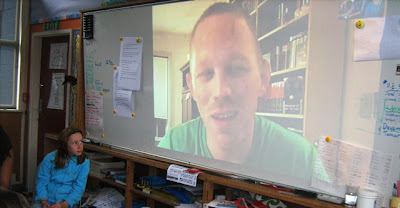One Saturday afternoon I was trying to organize for my coming week at school--plan lessons, print needed handouts, grade papers. You know...the never-ending tasks of teacherhood.
As I often do, though, I became lost in my Google Reader. (I'm finding my RSS reader bewitches me; hours can go by while I catch up on the blogs I follow, seeing what others are learning and reflecting upon.) On the afternoon in question, I enjoyed most-of-all Tracy Watanabe's post about essential questions.
In the comments on Tracy's post, I mentioned I was not a faithful user of essential questions. I've known about them since Understanding by Design and the Intel Teach to the Future program I was involved in more than ten years ago. However, I have not always remembered to use them in my teaching. Tracy's post reminded me of their importance. Then, again in the comments section, she responded back to me with an example of how she used an essential question with the book Ramona Quimby, Age 8.
Tracy wrote:
"I remember the first time I used an essential question, it was when I was a 3rd grade teacher, and we were starting Ramona Quimby, Age 8 (I love Beverly Cleary books!) My EQ was something like, "What does a 'sticking-together' family look like?" -- There was one discussion about cause-effect based on something Ramona Q did in the book, and the kids decided that she had a choice in how she responded... and her response would affect the whole family... so when things came up in their own lives, they shouldn't take it out on their own family... This conversation was 10 years ago, but I remember it so well because I was amazed at what those little 8 year olds were realizing about being proactive in their choices, all from a literature discussion. Furthermore, I don't think our conversation would have gone that direction without that EQ."
So the next day, as we discussed our book Among the Hidden, my students were asked an essential question I found here. How much control should government have? We had such a fascinating conversation with that question that I had them write our essential question inside the front cover of their book copy.
As the book continued to progress we saw more signs of the unbridled control of government in this futuristic totalitarian society. The people were required to only have two children. They weren't allowed to grow food hydroponically, even though there was a purported food shortage. We continue to ask questions about why "they" (the government) could do those things and how they could get away with it.
I asked my students to help me write this blog post by sharing some of their thinking to the essential question of Among the Hidden. Here are some of their responses.
The government should have some control of our lives, but no more than two kids is really too much that they are asking for.
The government shouldn't tell us what we can and can't buy, unless it's illegal drugs. The government shouldn't tell us how many kids that we can have. The government shouldn't shut down food companies because it is unhealthy. They should have a little control. If they do things we don't like we can protest.
Government should protect us from harming ourselves and others. The government shouldn't tap our phones and barge in and take control.
I think that the government should watch us, but not control our everyday lives.
The purpose of government is to make safe rules, but if they go over and beyond that fact, then we have a right to protest for what we believe is right. The government should not make pathetic rules like they did in this book.
Absent Anna chatted from grandma's.
We need to trust our government. Otherwise, we could do whatever we wanted and there would be a lot of killers in the world.
We should be able to do anything that isn't harmful or dangerous. The government should just try to keep things fair and safe.
I don't think the government should have as much power as they do now.
The purpose of government is so nobody gets out of control.
If the government gets too powerful we can protest, strike, boycott, and vote people out of office.
We are not quite finished with the book, but before we finish, my students will see that the government asserts ultimate evil authority when it kills some young protestors.
With this one piece of children's literature, we have been invited into engaging and important conversations. We are discussing world issues like the differences between elected and non-elected governments, our Bill of Rights, liberal vs. conservative governing, protests in Libya, Egypt and Syria, as well as important personal liberty issues.
Had Tracy not challenged me when she shared her use of an essential question with Ramona Quimby, I don't believe we would have had so many great discussions focusing on the theme of Among the Hidden. So, will you join Tracy and me in this conversation?
What is an essential question you've used with a children's book?
Will you share it on this Google spreadsheet?
Will you share it on this Google spreadsheet?
Or on a comment below.
Thank you!







